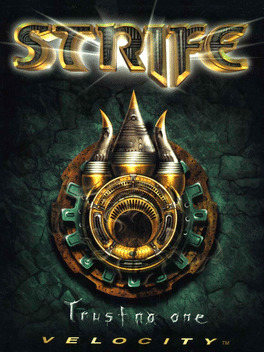
Hexen II is a dark fantasy first-person shooter (FPS) video game developed by Raven Software and published by id Software in 1997. It is the third game in the Hexen/Heretic series, and the last in the Serpent Riders trilogy. Using a modified Quake engine, it features single-player and multiplayer game modes, as well as four character classes to choose from, each with different abilities. These include the "offensive" Paladin, the "defensive" Crusader, the spell-casting Necromancer, and the stealthy Assassin.

id Software LLC is an American video game developer based in Richardson, Texas. It was founded on February 1, 1991, by four members of the computer company Softdisk: programmers John Carmack and John Romero, game designer Tom Hall, and artist Adrian Carmack.

Quake III Arena is a 1999 multiplayer-focused first-person shooter developed by id Software. The third installment of the Quake series, Arena differs from previous games by excluding a story-based single-player mode and focusing primarily on multiplayer gameplay. The single-player mode is played against computer-controlled bots. It features music composed by Sonic Mayhem and Front Line Assembly founder Bill Leeb.

Quake II is a 1997 first-person shooter video game developed by id Software and published by Activision. It is the second installment of the Quake series, following Quake.

Quake is a first-person shooter game developed by id Software and published by GT Interactive. The first game in the Quake series, it was originally released for MS-DOS, Microsoft Windows, and Linux in 1996, followed by Mac OS and Sega Saturn in 1997 and Nintendo 64 in 1998.

Strife is a first-person shooter role-playing video game developed by Rogue Entertainment. It was released in May 1996 in North America by Velocity Inc. and in Europe by Studio 3DO. The shareware version was released on February 23, 1996, while the full version was released on May 3. It was the last commercially released standalone PC game to utilize the id Tech 1 engine from id Software. The plot takes place in a world taken over by a religious organization known as "The Order"; the protagonist, an unnamed mercenary, becomes a member of the resistance movement which aims to topple the Order's oppressive rule.

Quake 4 is a 2005 first-person shooter video game developed by Raven Software and published by Activision. It is the fourth title in the Quake series, after the multiplayer Quake III Arena, and a sequel to Quake II. Raven Software collaborated with id Software, who supervised the development of the game as well as provided the id Tech 4 engine upon which it was built. The game has an increased emphasis on single-player gameplay compared to previous installments; its multiplayer mode does not support playable bots.
Quake is a series of first-person shooter video games, developed by id Software and, as of 2010, published by Bethesda Softworks. The series is composed of Quake and its nonlinear, standalone sequels, which vary in setting and plot.
Katherine Anna Kang is an American video game designer.

Counter-Strike: Condition Zero is a first-person shooter video game developed by Ritual Entertainment, Turtle Rock Studios, and Valve, and published by Sierra Entertainment and Valve. The follow-up to Counter-Strike (2000), it was released in March 2004 for Windows. Condition Zero utilizes the GoldSrc engine and has a multiplayer mode, which features updated character models, textures, maps and other graphical tweaks. It also includes two single-player campaigns; Tour of Duty and Condition Zero: Deleted Scenes.

GameSpy was an American provider of online multiplayer and matchmaking middleware for video games founded in 1999 by Mark Surfas. After the release of a multiplayer server browser for Quake, QSpy, Surfas licensed the software under the GameSpy brand to other video game publishers through a newly established company, GameSpy Industries, which also incorporated his Planet Network of video game news and information websites, and GameSpy.com.

id Tech 3, popularly known as the Quake III Arena engine, is a game engine developed by id Software for their video game Quake III Arena. It has been adopted by numerous games. During its time, it competed with the Unreal Engine; both engines were widely licensed.

Enemy Territory: Quake Wars is a first-person shooter video game developed by Splash Damage and published by Activision for Microsoft Windows, Linux, Mac OS X, PlayStation 3 and Xbox 360. The game was first released in the PAL region on September 28, 2007, and later in North America on October 2. It is a spinoff of the Quake series and the successor to 2003's Wolfenstein: Enemy Territory.
Mountain King Studios is a computer game company located in Chicago, Illinois. It was founded by game programmer/game designer Scott Host. In addition to the development of Raptor: Call of the Shadows, Cygnus also collaborated with Apogee Software on a number of their games. Some members of the company split to form Rogue Entertainment, while the company itself was renamed "Mountain King Studios".

Timothée Besset is a French software programmer, best known for supporting Linux, as well as some Macintosh, ports of id Software's products. He was involved with the game ports of various id properties through the 2000s, starting with Quake III Arena. Since the development of Doom 3 he was also in charge of the multiplayer network code and various aspects of game coding for id, a role which had him heavily involved in the development of their online game QuakeLive. Since departing id in January 2012 he has worked as a software contractor, including for Valve Software.

Star Trek: Voyager – Elite Force is a first-person shooter video game developed by Raven Software and published by Activision. The game was originally released on September 15, 2000 for Windows and Mac OS. A port for Mac OS developed by Westlake Interactive and published by Aspyr Media was released on November 20, 2002. Elite Force was ported to the PlayStation 2 by Pipe Dream Interactive and published by Majesco Entertainment on December 11, 2001.

A first-person shooter (FPS) is a video game centered on gun fighting and other weapon-based combat seen from a first-person perspective, with the player experiencing the action directly through the eyes of the main character. This genre shares multiple common traits with other shooter games, and in turn falls under the action games category. Since the genre's inception, advanced 3D and pseudo-3D graphics have proven fundamental to allow a reasonable level of immersion in the game world, and this type of game helped pushing technology progressively further, challenging hardware developers worldwide to introduce numerous innovations in the field of graphics processing units. Multiplayer gaming has been an integral part of the experience, and became even more prominent with the diffusion of internet connectivity in recent years.

GoldSrc, sometimes called the Half-Lifeengine, is a proprietary game engine developed by Valve. At its core, GoldSrc is a heavily modified version of id Software's Quake engine. It made its debut in 1998 with Half-Life and powered future games developed by or with oversight from Valve, including Half-Life's expansions, Day of Defeat and games in the Counter-Strike series.
Counter-Strike (CS) is a series of multiplayer tactical first-person shooter video games in which teams of terrorists battle to perpetrate an act of terror while counter-terrorists try to prevent it. The series began on Windows in 1999 with the release of the first game, Counter-Strike. It was initially released as a modification ("mod") for Half-Life that was designed by Minh "Gooseman" Le and Jess "Cliffe" Cliffe before the rights to the mod's intellectual property were acquired by Valve, the developers of Half-Life, who then turned Counter-Strike into a retail product released in 2000.















